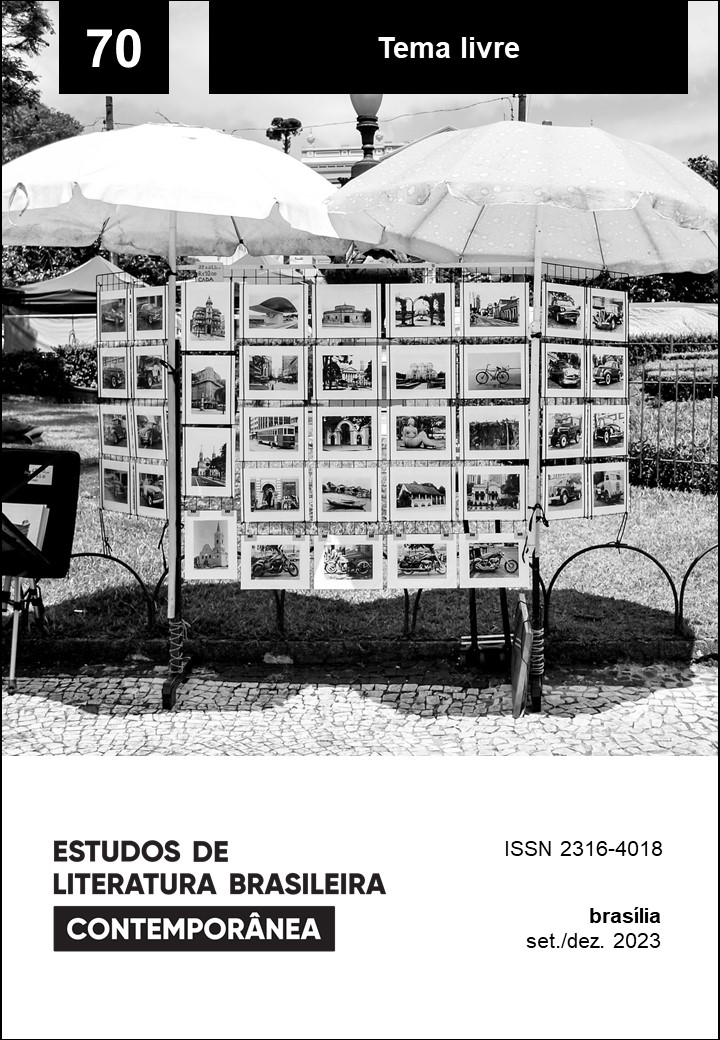Lesbian love and silence in Mar Becker’s poetry
DOI:
https://doi.org/10.1590/2316-40187010Keywords:
lesbian protagonism; contemporary Brazilian literature; Mar BeckerAbstract
This paper proposes an investigation of two poems that make up the section “Lesbos”, from the work A mulher submersa (2020), by Mar Becker. From an analysis of the expression plane, content plane and their intersections, the effects of meaning of these texts are observed, to reflect on lesbian protagonism in contemporary Brazilian literature of female authorship. To bring the lesbian love to the center of literary studies, this study aimed to value productions that focus on the role of lesbian women in Brazilian literature and a representation free of censorship, taboos or stereotypes. The re-signification of silence, in particular, is emphasized: even though, historically, women have loved each other in silence due to social coercion, Becker works this silence as one that is only possible in the comfort between two equals who recognize each other; as a love that does not need status, jurisdiction or the support of the dominant discourse to legitimize it; that survives even if they try to push it to the footnotes of history; that can be understood without the need for explanations. According to the author (Becker, 2020, translated by the author), “the love of a man/for a woman depends on so many words/but a woman loves another in silence”.
Downloads
References
BECKER, Mar (2020). A mulher submersa. Bragança Paulista: Urutau.
EVARISTO, Conceição (2014). “Beijo na face”. In: EVARISTO, Conceição. Olhos d’água. Rio de Janeiro: Pallas, p. 55-62.
FERREIRA-PINTO, Cristina (1999). O desejo lesbiano no conto de escritoras brasileiras contemporâneas. Revista Iberoamericana, Pitesburgo, v. 65, n. 187, p. 405-421. https://doi.org/10.5195/reviberoamer.1999.6082
» https://doi.org/10.5195/reviberoamer.1999.6082
FREITAS, Angélica (2020). Canções de atormentar. São Paulo: Companhia das Letras.
GRAHAM, Dee L. R.; RAWLINGS, Edna I.; RIGSBY, Roberta K. (2021). Amar para sobreviver: mulheres e síndrome de Estocolmo social. Tradução de Mariana Coimbra. São Paulo: Cassandra.
JEFFREYS, Sheila (2018). The Lesbian Revolution: Lesbian Feminism in the UK 1970 – 1990. Abingdon: Routledge.
POLESSO, Natalia Borges (2015). “Marília acorda”. In: POLESSO, Natalia Borges. Amora. Porto Alegre: Não Editora, p. 132-136.
POLESSO, Natalia Borges (2018). Geografias lésbicas: literatura e gênero. Revista Criação & Crítica, n. 20, p. 3-19. https://doi.org/10.11606/issn.1984-1124.v0i20p3-19
» https://doi.org/10.11606/issn.1984-1124.v0i20p3-19
RICH, Adrienne (2010). Heterossexualidade compulsória e existência lésbica. Bagoas, v. 4, n. 5, p. 17-44. Disponível em: https://periodicos.ufrn.br/bagoas/article/view/2309 Acesso em: 29 out. 2023.
» https://periodicos.ufrn.br/bagoas/article/view/2309
SILVA, Fabio Mario da; VILELA, Ana Luísa (2011). Homo(lesbo)erotismo e literatura, no Ocidente e em Portugal: Safo e Judith Teixeira. Navegações, v. 4, n. 1, p. 69-76. Disponível em: https://revistaseletronicas.pucrs.br/index.php/iberoamericana/N%C3%83%C6%92O%20https:/www.scimagojr.com/index.php/navegacoes/article/view/9442 Acesso em: 25 nov. 2022.
Downloads
Published
How to Cite
Issue
Section
License

This work is licensed under a Creative Commons Attribution-NoDerivatives 4.0 International License.
Authors who publish in this journal agree to the following terms:
a) The authors maintain the copyright and grant the journal the right of first publication, the work being simultaneously licensed under the Creative Commons Attribution License-Non Commercial 4.0 which allows the sharing of the work with acknowledgment of the authorship of the work and publication this journal.
b) Authors are authorized to enter into additional contracts separately, for non-exclusive distribution of the version of the work published in this journal (eg publish in institutional repository or as a book chapter), with authorship recognition and publication in this journal.
c) Authors are allowed and encouraged to publish and distribute their work online (eg in institutional repositories or on their personal page) after the editorial process, as this can generate productive changes, as well as increase the impact and citation of published work (See The Effect of Free Access).
d) The authors of the approved works authorize the magazine to, after publication, transfer its content for reproduction in content crawlers, virtual libraries and the like.
e) The authors assume that the texts submitted to the publication are of their original creation, being fully responsible for their content in the event of possible opposition by third parties.


